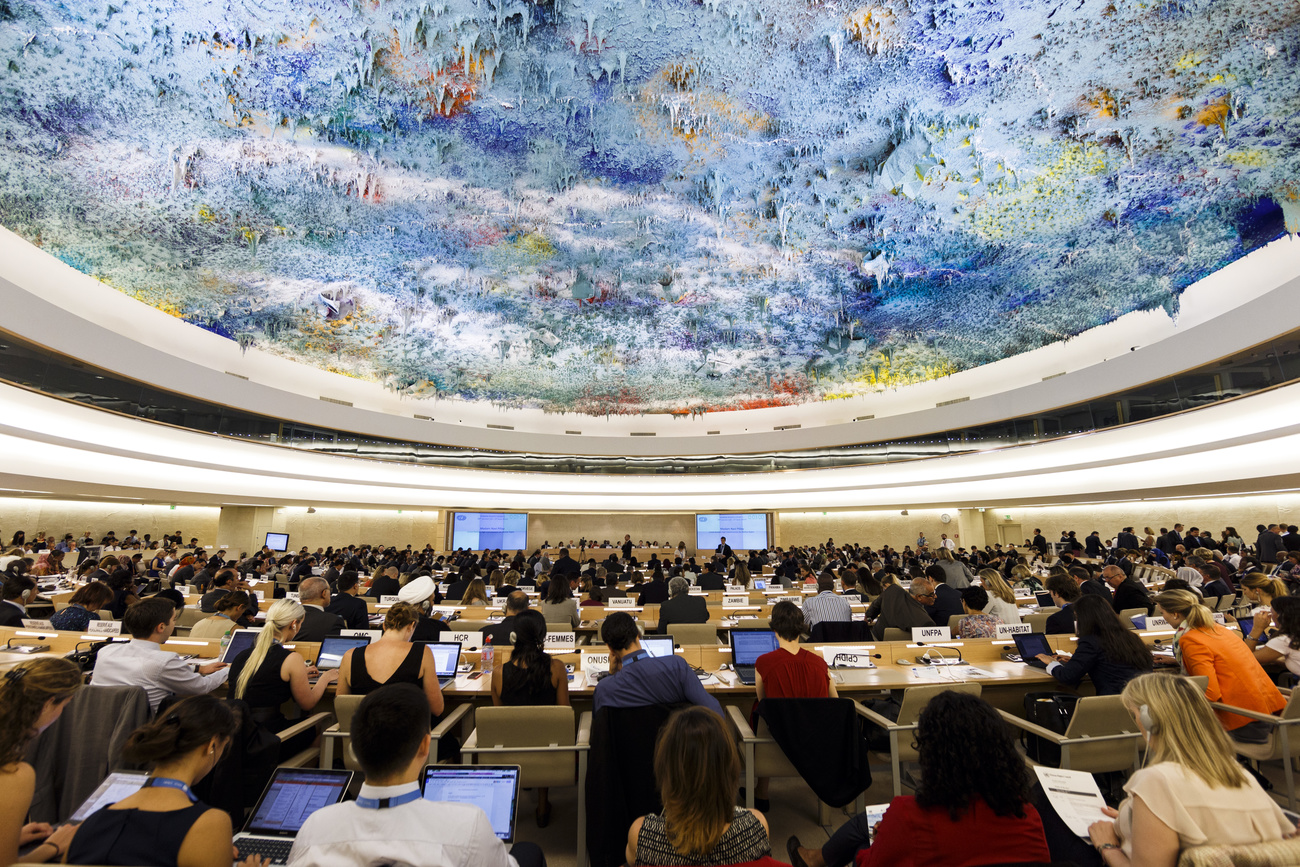
Litmus test for Human Rights Council as Russia bids for seat

On Tuesday the UN General Assembly in New York will vote for 15 new members of the 47-member Human Rights Council. With gross human rights abusers Russia, China and Burundi among the candidates, the credibility of the Geneva-based Council is at stake.
“Russia’s candidacy is a cynical attempt to return to the Council following its suspension by the General Assembly in April 2022External link in reaction to its full-scale invasion of Ukraine,” said the Geneva-based NGO International Service for Human Rights (ISHR) in a September 4 press releaseExternal link.
In April last year, shortly after the Russian invasion of Ukraine, Russia became only the second country in history (after Libya under Gaddafi) to have its membership of the Human Rights Council suspended, which needed a two-thirds majority from the General Assembly. It subsequently resigned, but it is now running for another mandate. Only the 47 sitting members of the Council have voting rights, meaning they are the ones who decide, for example, whether countries get scrutinised and criticised for their human rights records.
Marc Limon, director of the Geneva-based Universal Rights Group, says electing Russia as a member would be “morally completely wrong”. “If the General Assembly suspends a country for committing gross and systematic human rights violations and then elects that same country back while those same violations are ongoing and there’s been no accountability, it would be a disaster for the credibility of the Human Rights Council and the credibility of the United Nations,” he told SWI swissinfo.ch.
These elections are organised in regional groups. The Central and Eastern Europe group has three candidates for two seats: Albania, Bulgaria and Russia. Limon says Russia has been campaigning for “a long time”, and Albania only came in as a candidate – probably under pressure from Western states – relatively late.
China has no competition
Human rights organisations are also opposing the candidacy of China, which is a current Council member and is running for a second term. They point to a UN report released a year ago that pointed to possible crimes against humanity against Uyghurs and other minorities in China’s western Xinjiang province, as well as Beijing’s “appalling human rights recordExternal link” in Tibet and Hong Kong.
UN General Assembly resolution 6251External link, which created the Human Rights Council in 2006, says that “members elected to the Council shall uphold the highest standards in the promotion and protection of human rights” and “shall fully cooperate with the Council”. But this is manifestly not the case for either China or Russia.
Unlike Russia, China faces no competition in its regional group, where there are four candidates for four seats. It looks set to be re-elected, but Salma El Hosseiny of ISHR says states can still make a stand. “States are not obliged to vote for all the candidates, even if it’s a closed slate,” she told SWI. “By not voting for candidates that don’t fit the criteria, this sends a strong message, even if they are elected in the end.”
ISHR is also urging an end to closed slates. “This is a concern with the process,” said El Hosseiny. “One of our key messages is that all the regional groups should present more candidacies than available seats to ensure that elections are competitive.”
War crimes and Stalinist repression
A UN commission of inquiry on Ukraine, mandated by the Human Rights Council, said in March that Russia had committed a “wide range” of war crimes in Ukraine and possibly crimes against humanity. In an update to the Council in September it saidExternal link the commission was also concerned about allegations of genocide in Ukraine. “Some of the rhetoric transmitted in Russian state and other media may constitute incitement to genocide,” the report stated.
Russian President Vladimir Putin and his child protection chief have been indicted by the International Criminal CourtExternal link for forcibly deporting children as a war crime.
The UN Special Rapporteur on human rights in Russia also reported in September that the scale of repression within that country was “unprecedented” since the Stalinist era.
What are Russia’s chances?
Given all the above, Russia’s candidacy would seem to be a “joke”, as African human rights defender Hassan Shire wrote in an opinion piece published on the Universal Rights Group websiteExternal link, but it isn’t. “An even more distasteful joke would be to see it elected,” he continued. And this is not entirely impossible.
Limon says states are supposed to vote according to the membership criteria, but in reality it is more a question of “horse trading” in support for candidacies in different international organisations. Russia has prepared the ground in this bargaining process, and he thinks Moscow is less totally isolated than it was last year, when all the focus was on Ukraine after the invasion.
Limon thinks Bulgaria is safe for a seat on the Human Rights Council, but that it could be tight between Russia and Albania. “I am very, very worried,” he told SWI. If Russia were to be elected, he says it could call into question the very future of the Human Rights Council. He recalls that the main reason for the collapse of the UN Commission on Human Rights, the Council’s predecessor, was the issue of membership and gross human rights abusers sitting on it.

In compliance with the JTI standards
More: SWI swissinfo.ch certified by the Journalism Trust Initiative





























You can find an overview of ongoing debates with our journalists here . Please join us!
If you want to start a conversation about a topic raised in this article or want to report factual errors, email us at english@swissinfo.ch.